Coming here from SparkFun.com? Pick up where you left off.
ReplaceMeOpen
ReplaceMeClose
Teaching for SparkFun I get the opportunity to travel around the U.S. teaching technology to people from all walks of life and all levels of knowledge. I’m not always sure what the abilities of the audience will be and I rarely know how much time the participants will have after my workshops to pursue physical computing. Combine these uncertainties with things like a slight language barrier, inconsistent electricity supply, a lot less digital nativity in the student population and a team I’d never worked with before and you’ll start to get an idea of what I thought I was headed into when I went to Uganda to teach physical computing this summer. The reality was that it was surprisingly similar to what I do in the U.S., but with a different set of hurdles.
I’m getting ahead of myself. In October of 2012 I was in Boston teaching some classes at the Artisan’s Asylum, Tufts and M.I.T. with Jim “The Engineer” Lindblom. I had been talking to tech support about a woman who wanted to bring robotics to Uganda, Africa who had some questions about what she should be ordering. I wound up pacing in my hotel room on a rainy Boston afternoon talking to Sandra for about an hour. Sandra Washburn runs a Ugandan based non-profit called Oysters and Pearls. While she is a very persuasive and capable woman we both quickly realized she wouldn’t be able to lead these workshops by herself. I initially explained that SparkFun was concentrating on the U.S. and our National Tour during the next summer but that I would be happy to help her figure out what to take over to Africa as well as provide some free training. Here is the Wishlist I gave her. I also agreed to put her in contact with a man named Solomon King who was, and still is, building a team of technology educators and equipment by the name of Fundi Bots to help his country’s growth in that area. Near the end of our conversation Sandra said something to the effect of “I’m not asking SparkFun to come to Uganda, I’m asking you. You’ve got vacation time, right?” I told her I would think about it.
The next day on our way to the next workshop I asked Jim what he thought about the proposition. He looked at me immediately and said, “You’ll regret it for the rest of your life if you don’t.” Jim’s a smart guy. He knows all the words to Gangnam Style and a whole bunch about physical computing and sensors and stuff. I decided that Jim knew exactly what he was talking about.
Eight months later I’m on a plane to Africa to help a bunch of people I’ve never met in real life teach robotics on a continent I’ve never been to. Sweet.
I arrived in Uganda late in the evening. Bosco, an incredibly friendly and knowledgeable man (he speaks something like 10 to 14 languages!) picked me up at the airport and we headed to Kampala, the capital city of Uganda. The next day Sandra, Solomon and I met with people from the Makerere University to discuss possible SparkFun, FundiBots and Makerere partnership possibilities. Afterwards we toured their engineering department. They run their student computers using a bunch of thin clients with one central server. Makerere, especially some graduate students by the names of Maximus and Cosmos, expressed an interest in hands-on-learning in their engineering classes. A sentiment my department hears echoed across the U.S. as well, regardless of the age level.
The next day was a travel day. We packed up the vans, I met Sylvia, Arnold and Victor, with whom I would be teaching. There was also another woman by the name of Jennifer Stimpson who was there to teach chemistry and leadership to young Ugandan women in her own program. We piled into our two vans and headed north to Gulu. We stopped for lunch at the Kabalega Diner before traveling on through baboon territory and the beautiful Karuma Falls. By the time we arrived at the orphanage where we would be staying for the next three weeks it was near dark. We met some of the kids, but they were very shy and none of us were quite sure what we had gotten ourselves into. The Ugandan tech ed team lived in Kampala and had never been in a situation like that before and I was just trying to make sure that I didn’t accidentally overstep my bounds as a visitor.
We had nothing to worry about. The next morning Solomon and I went out to say hello to the swarms of kids outside. One of them asked to wear my hat and sunglasses. I told him he could, but that everyone needed to get a turn. That did it. Next thing I know Solomon and I are literally covered in tiny kids introducing themselves, shouting, clapping, jumping, smiling, trying on my aviator glasses and generally declaring themselves “Boss” to anyone who will listen.
Day four found us talking to the entirety of Gulu High about what we hoped to teach the students. We toured the area they use to teach blind children and met many of the local faculty. Afterwards we cleaned their computer lab. Many of the computers in the lab reminded me of the PC towers I used in my childhood. That’s not to say that they couldn’t be used for tech ed. Solomon and I discussed the possibilities and advantages of Arduino and Scratch having such a low overhead as far as hardware is concerned. That night I stayed up with Victor, Arnold and Solomon teaching them the basics of Processing so that they could expand the types of technology they teach.
The next day we interviewed all the students interested in joining the robotics club. There were eighty students interested. Solomon and I had decided we wanted to take thirty at the most, so we had our work cut out for us. We went through every single application trying to find the ones who had experience or showed promise beyond the ordinary. It was, and always is, the hardest part of teaching. Given the time and resources our team would have taken every single one of the applicants.
Finally after all that prep we had our first day of teaching. We covered basic electron theory in both the formal manner and using goats and pigs as an analogy for electrons, with various paths they can take around the village and mud providing resistance. For the hands-on portion we created simple e-origami circuits with copper tape, coin cells and LEDs. By having them replace parts, change the circuit and create their own buttons we got to see the “Aha!” moment in many of their lives. In particular was a trio of girls who called themselves the Skimpy Triplets. After one of them caught on to where I was trying to lead them she shooed me away and turned to explain the concepts to the other two. Perfect, that’s what we’re after.
The days that we taught at Gulu High were pretty much like that. We woke up around 8 a.m., did prep work for teaching that day, got lunch around noon, headed over to Gulu High to teach for three hours, grabbed dinner and then I spent the evenings teaching the teachers, sometimes until 3 or 5 in the morning. One night while we were wrestling with a weird Processing and Arduino hook-up issue the room filled with giant bugs. It turns out they were white ants and edible!, so we took a break to collect ants for snacking on and then returned to tech ed. Imagine a world where snacks literally fly at you and fall out of trees. These guys are living it.
On the eighth and ninth days we taught some of the kids at the orphanage all about Scratch and Pico Boards. Our re-occurring team of Solomon, Victor, Arnold and I was complimented by the addition of Sandra and Solomon’s sister, Rachael. Most of the students had never seen a computer before, but by the end of the second day they were using the Pico Board inputs to do digital DJing and understood the concept of “if” statements. We also had some older inhabitants of the orphanage attend, with the hope that a computer lab will be built and run by the people at the orphanage. With the help of Sandra and Rachael, both of whom will be in and out of Gulu in the coming years, I have high hopes for the orphanage’s robotics club even if I am not able to make it back as often as I would like. Many of the children in the orphanage are wheel chair bound and the digital world represents a space where they are just as free to play as anyone else without any of the physical restrictions to which their lives are normally subjected. Add that simple joy to the technological horizon that microcontrollers represent and you can see why there is so much support for Fundi Bots and Oysters and Pearls in the community.
Throughout the trip I was amazed at students who, having never seen a computer before, often excelled at exploring the physical computing curriculum we presented to them. They would be incredibly attentive during the lecture portions, knowing that the knowledge they gleaned from the class might help them make their family and friends lives better. The main hurdles we found were the simplest ones, things you and I most likely take for granted. Actions such as “right click”, “left click” and “double click” had to be addressed before talking about concepts like input and output. Keyboards were a strange territory once we got past the alphabet and had to use other symbols for Boolean logic. Another interesting problem to deal with was the tendency of the electricity to go out. It was important to be able to abandon exploring code on the projector when it went out and move on to how the circuits all work on a black board while waiting for the generator to kick in. These challenges just highlighted to me how useful the information we were giving these students could be in the future for them. They are interested first in understanding and fixing the technology they are working with currently. That is far more feasible and useful than the idea of inventing. Luckily, many of them are not deterred by their country’s lagging technology and do see the benefit in inventing for tomorrow as well as fixing today.
I was also struck by the resourcefulness inherent in their robotics programs. Victor’s robot was created using the motors in old hard drives, capacitors and resistors he had harvested from old electronics and even a base plate made of newspaper pulp and glue. Having grown up on a farm I appreciated the type of mentality that would take whatever tools and materials were available and figure out how to do the job. Victor and Solomon even described to me during one of our late night soldering sessions how they would heat up a knife blade or nail in a fire, hold it with pliers and use that as a soldering iron in a pinch. Often their understanding of electrical concepts was almost at a mid-brain level. There were no data sheets to look at while they were learning so they used multi-meters, learned to identify parts by sight, not part number and learned complex electrical circuits often without using the theory inherent in western engineering.
In order to make my presence have a lasting impact the nightly hacking sessions covered a wide variety of concepts. It was important to me that Solomon and his team be able to teach a wide variety of concepts at multiple different levels. After all, here was a small dedicated team striving to do for Uganda what SparkFun, countless universities, afterschool programs, K-12 tech educators, the National Electronics Museum and untold other numbers of teachers and organizations too many to count are doing for the U.S.. I figured that the team in Uganda could use every tool I could give them. We covered Arduino, Processing, Blue Tooth basics, PTH rework, the ATmega328 Datasheet, using an FTDI, Arduino interrupts, Fritzing, Scratch, Arduino programming with an Android tablet, communication between Android and Arduino, using a shift register to explore how memory works at the electrical level, leveraging existing educational communities to the larger community’s benefit, mp3 triggers, ATtiny chips and associated extra libraries, all with an occasional break to slaughter a chicken for dinner or crack open a Jackfruit.
At the end of the two week program we all piled into one of Gulu High’s classrooms for a slide show and, of course, cake. The Gulu High students were incredibly proud to be a part of the longest running high school robotics class ever held in their country. I was impressed with how much they had learned in two weeks and hopeful that they would get a change to use the hardware again after I left thanks to Solomon and Sandra’s endeavors.
The next morning I saw my first African dawn. We packed up the van in an orphanage that sounded like sleeping children, which is to say not at all what I had grown used to. Tired and mindful of how different our lives are I said my goodbyes. I was a part of a team doing amazing things for kids who might otherwise never have experienced technology in this way. During the process we became good friends. I’m not sure if they expected that. I did. I was left with wonderment at the fact that, despite our cultural differences, opposite ends of the world and dissimilar resource availability, in the end the goals of Solomon’s team and SparkFun’s educational team are tantamount.
Additional pictures courtesy of Elemental Edge.
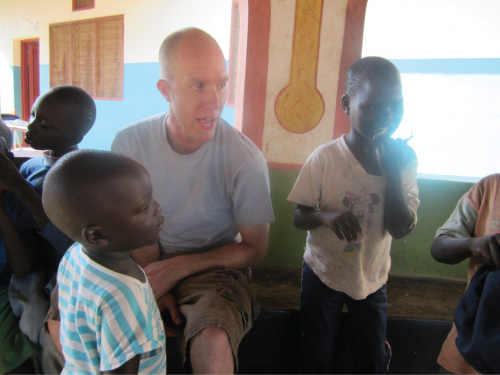
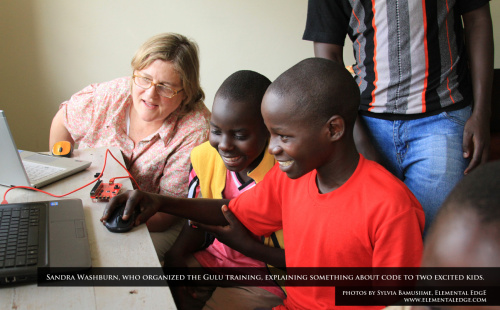
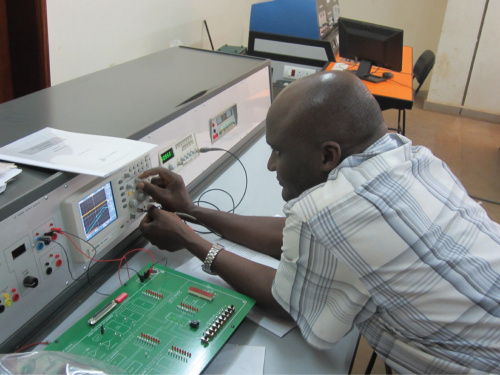
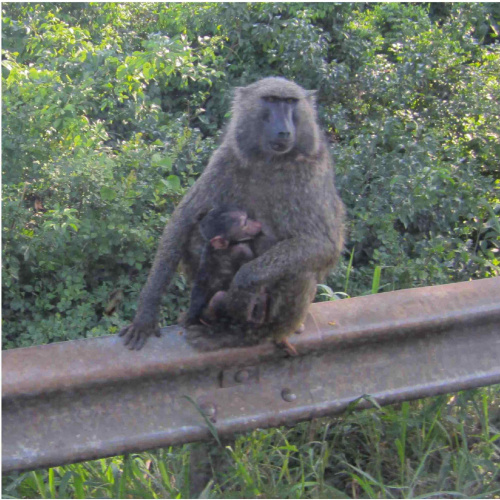
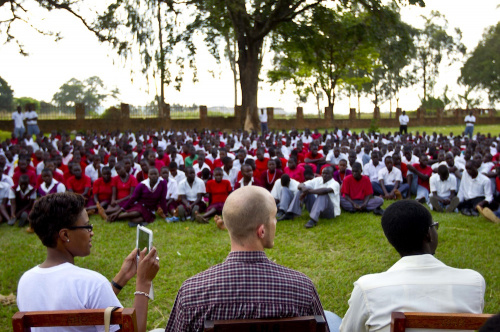
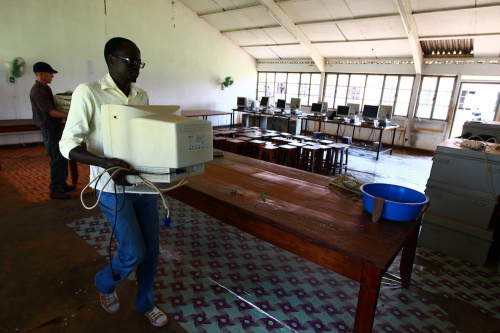
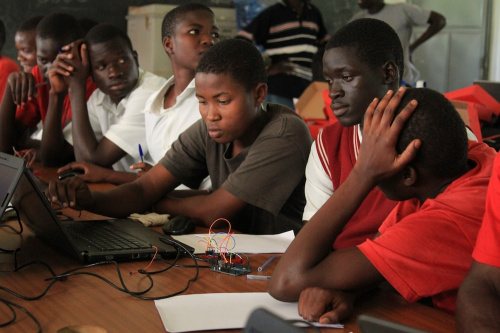
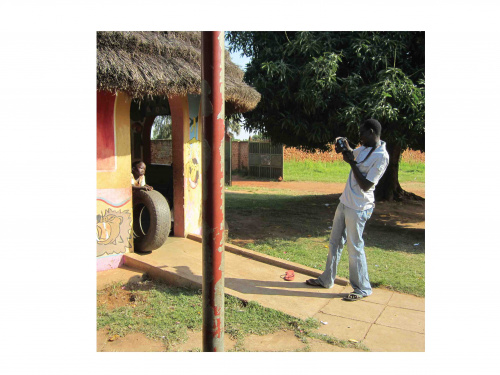
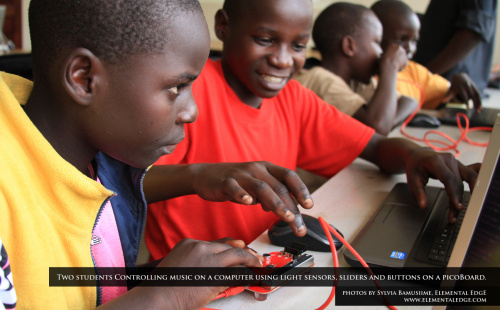
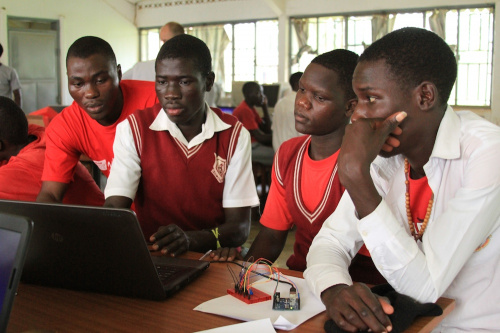
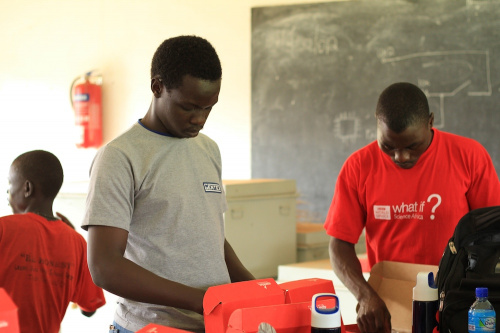
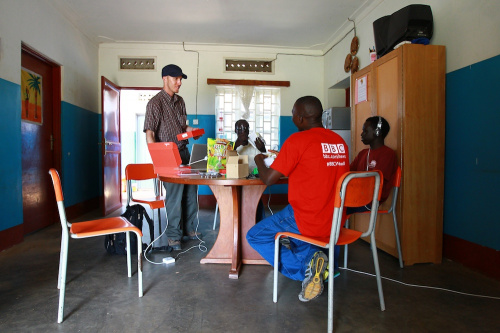
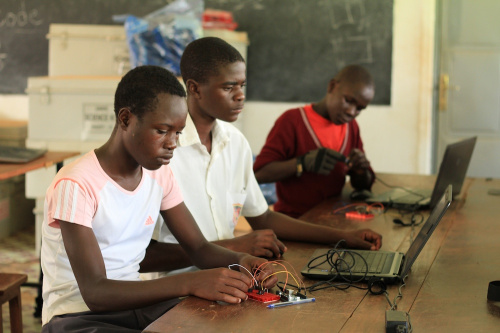




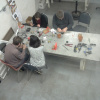

Linz, Thanks for sharing your wild and seemingly super rewarding (for you and the Ugandan kids) experience. That a way to extend the SparkFun Education national tour waaaay outside our geographic boundaries. What a gift you're all giving so many kids -- and adults. Creativity knows no boundaries! Cheers, Susan Moran
There was no "seemingly" about it. My friends in Uganda are awesome and I am honored to be able to help them. If I could have stayed longer I would have. Thanks for all the support for everything our department does! Whether it's in California, Colorado, Connecticut, or Gulu, it's all good.
Linz,
Thanks for sharing your amazing experience. I love how you communicate the need to share ideas but once learners grasp the empowerment that is received by them taking that information and passing it along. This network of learning is where innovation and invention take place. Your experience was amazing and I am glad that it is here to be shared and inspirational to others all over the world.
Cheers, Amy
I really enjoyed the video. Great job. As a teacher, I appreciate the valiant effort it took to do that. And also, the music for the video was perfect. John Williams, eat your heart out.
John Wolf
Linz, like I said in an earlier comment, it was an absolute pleasure working with you and introducing you to Ugandan culture. What we started in Gulu is just the tip of the ice-berg. We're planning so much more and we'd be honoured if you could join us once again on one of those sessions.
Arnold, Victor, Rachel and Sylvia send their regards.
Cheers!
King.
This is AMAZING hope this is just the beginning for them. Great work. Linz you are a role model for me now!
Orlando from El Salvador
Hi Linz,
Did you encounter any export control issues bringing technology to Uganda? If so, how did you navigate those issues? What about import duties?
Kevin
Linz,
Great work ! I am promoting the same concept in Togo, and would like to connect with you Please email me ( wedji@bridgeofcreativity.org) - Thanks
Wody Edji